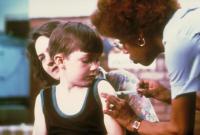-
New candidate vaccines against the plague show promise
The plague of Black Death infamy has had the power to strike fear in people since the Middle Ages — and for good reason. Once someone begins to show symptoms, the disease progresses very quickly and is almost 100 percent fatal without prompt treatment. Antibiotic-resistant Y. pestis strains have been isolated from plague patients and can be engineered for use as a bioweapon. Researchers have developed new potential vaccines that protect animals against the bacteria that causes the deadly plague.
-
-
Star-shaped polymers, not antibiotics, kill antibiotic-resistant bacteria
Currently, the only treatment for infections caused by bacteria is antibiotics. However, over time bacteria mutate to protect themselves against antibiotics, making treatment no longer effective. These mutated bacteria are known as “superbugs.” Tiny, star-shaped molecules are effective at killing bacteria that can no longer be killed by current antibiotics, new research shows. The research holds promise for a new treatment method against antibiotic-resistant bacteria, or superbugs.
-
-
Vaccine against “flesh-eating” bacteria in sight
Biochemists have uncovered patterns in the outer protein coat of group A Streptococcus that could finally lead to a vaccine against this highly infectious bacteria — responsible for more than 500,000 deaths a year, including toxic shock syndrome and necrotizing fasciitis or “flesh-eating disease.”
-
-
Climate, air travel maps identify countries in Africa, Asia at greatest risk of Zika virus
Many countries across Africa and Asia-Pacific may be vulnerable to Zika virus outbreaks, with India, China, the Philippines, Indonesia, Nigeria, Vietnam, Pakistan, and Bangladesh expected to be at greatest risk of Zika virus transmission due to a combination of high travel volumes from Zika affected areas in the Americas, local presence of mosquitos capable of transmitting Zika virus, suitable climatic conditions, large populations, and limited health resources. The authors of a new study say that identifying where and when populations would be most susceptible to local transmission of Zika virus could help inform public health decisions about the use of finite resources.
-
-
Zika reference strain sequenced; will help in diagnosis, screening
An international team of researchers has sequenced a strain of the Zika virus that will be used as a World Health Organization (WHO) reference strain to identify Zika virus infection in the blood, thus making it easier to diagnose the disease.
-
-
$2.3 million grant for Ebola vaccine research
The Center of Excellence for Emerging Zoonotic and Animal Diseases, or CEEZAD, at Kansas State University will use a $2.3 million federal grant to study the safety in livestock of a newly developed vaccine to protect humans from the Ebola Zaire virus. No infectious Ebola virus will be used in the Biosecurity Research Institute during the studies.
-
-
GMOs lead the fight against Zika, Ebola and the next unknown pandemic
The shadow of the Zika virus hangs over the Rio Olympic Games, with visitors and even high-profile athletes citing worries about Zika as a reason to stay away (even if the risk is probably quite low). The public’s concerns are a striking example of the need to rapidly combat emerging infectious diseases. In the fight against Zika, public health experts have turned to what may sound like an unlikely ally: genetically modified organisms, or GMOs. To protect the public, scientists have embraced GMO technology to quickly study new health threats, manufacture enough protective vaccines, and monitor and even predict new outbreaks. With the help of GMOs, infectious disease experts have the tools to get ahead of the next outbreak, moving beyond reaction to quick detection, containment and even prevention.
-
-
Anthrax capsule vaccine completely protects monkeys from lethal inhalational anthrax
Vaccination with the anthrax capsule — a naturally occurring component of the bacterium that causes the disease — completely protected monkeys from lethal anthrax infection, according to a new study. These results indicate that anthrax capsule is a highly effective vaccine component that should be considered for incorporation in future generation anthrax vaccines.
-
-
Infectious outbreaks must be combatted strategically: Experts
New funding is not enough to guarantee success against emerging infectious diseases around the world. Rather, good governance, a long-term technology investment strategy, and strong product management skills are essential. As momentum builds for an international effort to develop drugs and vaccines for emerging infectious diseases, experts examine U.S. biodefense programs to understand approaches that might work and developed a global strategy for countermeasure development.
-
-
Stagnant U.S. funding for tools against infectious diseases leaves U.S., world at serious risk
As Congress grapples with the White House on how to fund an emergency response to fight Zika virus, a new report warns that overall underfunding for development of lifesaving tools against neglected global diseases is putting the United States and the world at risk, and that emergency funding cannot be allowed to substitute for sustained U.S. investment in research and development (R&D) of global health technologies. A recent study that examined the risk of infectious disease outbreaks projected that large-scale global disease pandemics could cost the global economy more than $60 billion a year, while investing in the interventions needed to protect against these outbreaks, including R&D, would cost only a fraction of that — $4.5 billion — each year.
-
-
Resistance-proof antiviral can treat many diseases
Scientists and health officials are marshalling forces to fight Zika, the latest in a string of recent outbreaks. Many of these efforts target that virus specifically, but some researchers are looking for a broader approach. The new strategy aims to fight a wide range of viruses that appears to be safe in vivo and could evade a virus’s ability to develop resistance.
-
-
Most vaccine-related posts on Pinterest are anti-vaccine: Study

About 75 percent of the vaccine-related posts on Pinterest are negative toward vaccination, according to new research. Messages ranged from simple posts questioning the safety of vaccines to more radical claims that vaccines are being created to kill people. Twenty percent of the posts talked about conspiracy theories, such as pharmaceutical companies out to make money at the expense of children and governments trying to harm children for the purposes of population control. The authors are calling for better communication about vaccination.
-
-
FDA clears military traumatic wound dressing for use in civilian population
Early control of severe bleeding may prevent shock and may be life-saving., as 30 to 40 percent of civilian deaths by traumatic injury are the result of hemorrhaging. Of those deaths, 33 to 56 percent occur before the patient reaches a hospital. Last week the FDA cleared the use of the XSTAT 30 wound dressing, an expandable, multi-sponge dressing used to control severe, life-threatening bleeding from wounds in areas that a tourniquet cannot be placed (such as the groin or armpit) in battlefield and civilian trauma settings.
-
-
Study finds that Ebola vaccine is safe, stimulating strong immune responses

A clinical trial of a new Ebola vaccine that resulted from an unprecedented global consortium assembled at the behest of the World Health Organization (WHO) has found that it is well tolerated and stimulates strong immune responses in adults in Mali, West Africa and in the United States. If the vaccine is ultimately found to be safe and effective, it could offer crucial protection for contacts (family members, neighbors, etc.) of patients with confirmed Ebola disease in future epidemics, thereby helping to interrupt transmission. Larger trials of the vaccine sponsored, by GSK Biologicals, have already begun.
-
-
One in 8 children in U.S. at risk for measles

Gaps in measles vaccination rates in the United States place one in eight children at risk for becoming sick from the highly contagious illness, according to an analysis of national vaccination coverage. Measles can lead to pneumonia, encephalitis, hospitalization and occasionally, death. Those who are not vaccinated or are undervaccinated are highly susceptible to becoming ill because measles is very contagious through direct contact and droplets that can spread through the air.
-
- All
- Regional
- Water
- Biometrics
- Borders/Immig
- Business
- Cybersecurity
- Detection
- Disasters
- Government
- Infrastructure
- International
- Public health
- Public Safety
- Communication interoperabillity
- Emergency services
- Emergency medical services
- Fire
- First response
- IEDs
- Law Enforcement
- Law Enforcement Technology
- Military technology
- Nonlethal weapons
- Nuclear weapons
- Personal protection equipment
- Police
- Notification /alert systems
- Situational awareness
- Weapons systems
- Sci-Tech
- Sector Reports
- Surveillance
- Transportation
Advertising & Marketing: advertise@newswirepubs.com
Editorial: editor@newswirepubs.com
General: info@newswirepubs.com
2010-2011 © News Wire Publications, LLC News Wire Publications, LLC
220 Old Country Road | Suite 200 | Mineola | New York | 11501
Permissions and Policies
Editorial: editor@newswirepubs.com
General: info@newswirepubs.com
2010-2011 © News Wire Publications, LLC News Wire Publications, LLC
220 Old Country Road | Suite 200 | Mineola | New York | 11501
Permissions and Policies
